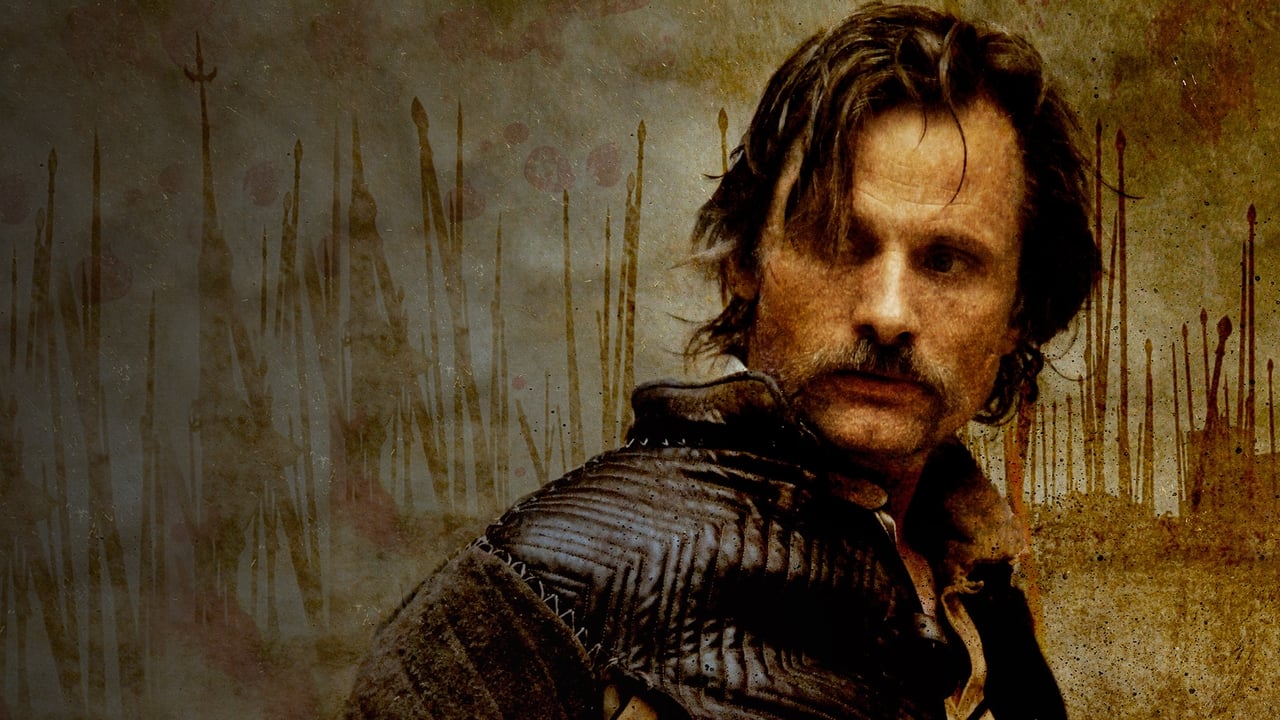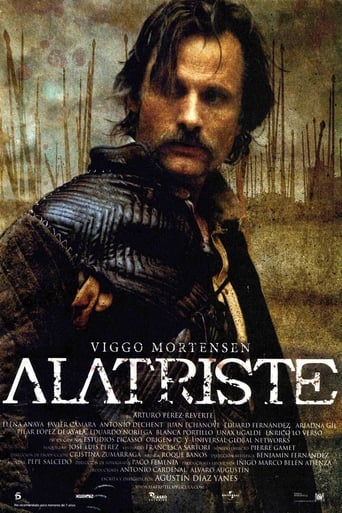

I gave it a 9... and I would have given this movie a 10 if only in the start they didn't say: "Spain ruled the world" ... which was widely acknowledged at that time and even at this time with all the historic studies that it wasn't true.Beyond the written introduction... I had to watch this movie 3 times in a row within a weeks' time in order to satisfy my believe that this theme is as close to Renaissance era as any other movie could make believe.Viggo's acting was incredible as usual... along with all other characters in the movie from start to finish.The storyline is remarkably amazing, along with the entire historical setting and cinematics. I couldn't be more happier for all history fans as I was.The ending was very aspiring, as well as "realistic" in my point of view; in comparison to Hollywood's bull-crap where the main character worships the girl at end of the movie, or in nicer words: the main character does a 100% complete change of profile at the very end of movie.But in Alatriste; Viggo starts as a mercenary and ends the movie being a mercenary... Not end it by running off with a girl and worship her till next world to come.I cannot say anymore words except please watch this if you are a history fan... it is beautiful !
... View Moreit is difficult to define it like a good or bad movie. it is , in same measure, not exactly an adaptation. because the ambition was to create a film in which Mortenson must be great. piece in Spanish atmosphere, with a lot of fight scenes, with a script like suggestion of few novels, with dark parts, love, sacrifice, traitors, competition between strong men, duty and a super hero in old fashion style. a film who hope to present fragments of charming tale of a Modern hero with crumbs of history. result - lovely movie for the fans. and nothing really new. because all is a play with a star. and the clothes of Alatriste is just new - old version of a series of roles. so, an usual drama of dark character , mixture of courage, loyalty, sadness, hope and sacrifice.
... View MoreThis lengthy film will likely disappoint North American readers who have yet to read the fifth in the Antonio Perez-Reverte historical series chronicling the life and death of one Captain Diego Alatriste. Then again very few will be aware that a film has been made, and that it stars VIGGO MORTENSON, best known here for his on-going role in the hugely successful adaption of J. R. R. TOLKIEN's THE LORD OF THE RINGS trilogy.This film attempts to compact the first five novels into one epic yet personal picture about Spain at the height of its powers. Unfortunately the fourth work in the series THE KING'S GOLD has only just become available in hardcover, AND it may be another two years before the fifth arrives! Significantly, I feel that American readers could find many parallels to this Spain and their own country. One memorable piece of verse says something like, Spain plundered the whole world alone, But now the whole world waits to plunder Spain alone.That said, I give this film low marks because of the difficulties my girlfriend and I had in viewing it. The film begins in Flanders and sets up the lifelong relationship between the fiercely independent Alatriste and Inigo, the son of a deceased comrade in arms. This situation which makes up most of the first novel is over and done with very quickly. So too is the introduction of the masterful Italian swordsman MALATESTA who is commissioned along with ALATRISTE to assassinate two visiting English members of the royalty.Somehow within the first hour we get to book four, THE KING'S GOLD. This is especially poorly done, as Alatriste's motivation for taking on the suicidal task is not properly explained and neither is his recruiting of the team. In the film a very moving celebration of life - for a condemned man - is somehow dismissed, and shown only because Alatriste approaches the man for help.So when the late night/early morning assault on the ship carrying gold from the Americas takes place we know of the men, and worse, the dutiful accountant - OLMEDILLA, if I remember correctly - written in such detail is invisible.As to the one great love in Alatriste's life, I do not recall the woman MARIA in any of the books, and she is really given short shrift in the film, though it is obvious that the Captain makes great sacrifices for her.Two other major concerns: no one ever addresses anyone else by name and so you have no idea who is who, and the girl Angelica is dark haired and not blonde with ringlets and green eyes! The running time of this film is frequently listed as 147 minutes but my copy courtesy of Xploited Video only runs 138 minutes (the credits are lengthy and accompanied by music that adds nothing).The first four books in the series probably total a 1000 pages, and sadly it shows. Thank you for your patience in reading this lengthy discourse.
... View MoreI welcome any feature film which brings History to life. 'Alatriste' presents us with a series of historical tableaux taken from Velazquez and other artists. King Philip IV, his chief minister Olivares, the poet Quevedo, the Surrender of Breda and the Battle of Rocroi are faithfully recreated from their paintings. However, accurate recreations of the past do not always produce a great film. This expensive and lavish work is not mediocre but lacks a dynamic story-line.Many Spanish reviewers believe that it was a mistake to compress 5 novels into one film. I agree. The film is strangely episodic and a little shallow in its depiction of both its characters and the large canvass of history over which it ranges.'Alatriste' can be translated as 'the gloomy one', a name presumably chosen by the author to reinforce the idea of a 'Golden Age' Spain already showing signs of decline. The tenor of the film is unremittingly gloomy with rather too little Spanish sunshine.Spanning the period 1622 to 1643, we are shown a decadent empire already conscious of its own decline. Towards the end of the period Olivares declares, "The honour and reputation of Spain are lost. All is misfortune." The poet Quevedo opines, "We are now a country of beggars who were once the centre of the universe." Is this historically accurate? Were leading Spaniards of this period so acutely prescient that their new-found wealth and power might be slipping from their grasp? Was Golden Age Spain such a self-consciously dark and anxious place? Or is this retrospective anachronism? The film certainly presents a critical view of the period. It is scathing about the Inquisition and its power several characters become its victims. Leading figures such as the King, Olivares, Secretary Alquezar, Chief Inquisitor Bocanegra are all depicted as intriguers. Alatriste serves their nefarious goals - including an attempt to assassinate the Prince of Wales and a scam to divert gold from paying soldiers to building palaces.The Alatriste character is a Common Man acting as a foil to the system he serves. Dour, uncommunicative, no deep thinker, he ventures few opinions about the world he inhabits. Two decades of loyal service eventually lead him to a verdict on his sovereign, "There are kings and kings and this one should govern." He becomes increasingly aware that he does not serve the best of masters. He is also dismisses the idea that things could be better for ordinary people under different rulers.Alatriste shows his own independence and sense of honour in this murky world by failing to complete his role as hired assassin and by purposely appearing before Olivares in worn boots. Alatriste is loyal to the Spain he serves but he does not always obey orders. It is Alatriste's decency and honour which makes him a hero. Decent acts include adopting the son of a fallen comrade and visiting and kissing the syphilitic love of his life as she nears death. He does not kill all those he beats in duels. Olivares calls him, "brave, discreet, trustworthy." Alatriste is deferent to his social superiors secular and religious -throughout the film but over time he becomes less so, eventually shouting at Olivares. This (productive) outburst is a metaphor for the rebellions that have broken out by 1640. He is useful to those he serves but cannot hope to enter their ranks or sup at their table.Class distinctions are underlined when an aristocratic comrade from the Flanders war rejects Alatriste's claim that they are 'brothers' "Not even in combat are we equal. God did not want it so." Brotherhood in arms is not allowed to cross class barriers. Likewise, our low-born hero has the title 'Captain' only in honorary recognition of his fighting qualities. He has no rank. Alatriste's and Inigo's loves both reject them in favour of greater social status and material security.Religion suffuses life. Catholic anti-Semitism is reflected in a vulgar reference to the size of Olivares' nose, an allusion to his 'tainted blood' as a descendant of converted Jews. The poet Quevedo calls him "a tyrant and descendant of Jews who are now sucking Spain dry." One soldier tells another,"You Portuguese are all half-Jews." Inigo is quite happy to say he has been killing heretics in Flanders. A wintry day in Madrid is 'as cold as a Lutheran.' Alatriste calls the 'black sun' of Flanders, "a heretic sun." Interestingly, several characters facing death disavow their belief in the Afterlife. Fear of the Inquisition kept such scepticism in check but it surely existed in the Catholic world.The fighting qualities of the Spanish infantryman provide a straw of pride for modern Spaniards to clutch at. The Battle of Rocroi shows pike-fighting contemporaneous with battles of the English Civil War depicted in the film 'Cromwell'. The siege of Breda shows trench warfare and tunnelling to undermine enemy positions which is comparable to World War I fighting. The initial Spanish raid to spike the Dutch cannon is also very instructive. Soldiers are badly fed, clothed and paid. Booty incentivises. Stoic pride and bravery underpin Alatriste's world.'Alatriste' is remarkably similar in structure to 'Goya's Ghosts' (2006) which is set in Spain two centuries later. Both films have a fictitious central character and story line set against real historical characters and events and over a similar time span. Both are lavish in their depiction of the past and both refer to the work of contemporary artists. Both damn the Inquisition as a monstrous instrument of tyranny. The Catholic Church was, surely, the world's first totalitarian organisation.'Goya's Ghosts' is a better film simply because it is held together by a central narrative. Its characters are fully developed and it is far more focused on the historical tale that it tells. 'Alatriste' is disjointed and produces a rather flat emotional effect. It is less than the sum of its parts.
... View More